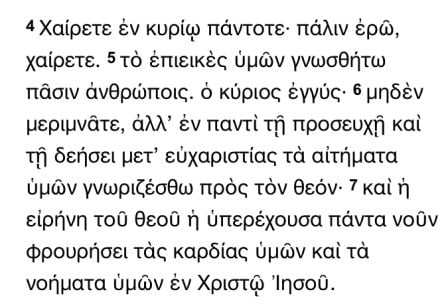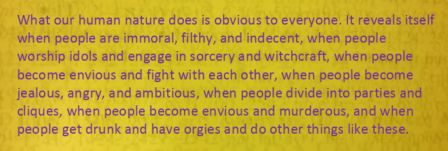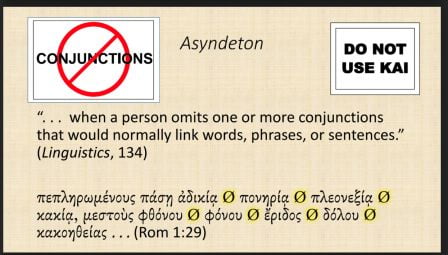For what it’s worth, here’s what I’ve learned. If the door is closed, don’t try to force it open. Let it go. No door closes without God’s loving approval. If the door is closing, let it close. Don’t keep trying to go into Asia. God has other plans.
David Alan Black, Dave Black Online.
Likewise, no door opens without God’s direction.
Category: Uncategorized
-
Dave Black on God’s Calls
-

Your Mind Matters
Monday, March 8
6:54 AM After a week off I’m eager to get back to campus and work harder on my craft than ever before. In his book Your Mind Matters, John Stott writes, “Knowledge is indispensable to Christian life and service. If we do not use the mind God has given us, we condemn ourselves to spiritual superficiality and cut ourselves off from many of the riches of God’s grace.”
But then he adds:
At the same time, knowledge is given us to be used, to lead us to higher worship, greater faith, deeper holiness, better service. What we need is not less knowledge but more knowledge, so long as we act on it.
That, I am ready to do, with the Lord’s help.
-

Who Does It?
(March 6, 2021) 6:10 AM Who’s work is it? It is yours or is it God’s? Already in our study of Philippians we’re having to ask this question. Paul has just thanked God for the Philippians’ participation in the gospel from the first day until now (1:5). That’s something they had done. But in the very next verse he attributes that work to God: “I am sure that God, who began this good work among you, will carry it on until it is finished.” In 2:12, Paul commands the church to work out their salvation with fear and trembling. But notice: they are to work out what God works in: “For God is the one at work among you both to give you the desire and the ability to do what pleases him.”
So, there’s our part and there’s God’s part. This is a constant theme in Paul’s writings. In Eph. 4:1 he turns from exposition to exhortation, from the indicative to the imperative, from what God has done in the past to what the Ephesians must do in the here-and-now, from doctrine to duty, from brilliant theology to mundane everyday living.
All this is simply to illustrate the great truth of the New Covenant: for the Christian, obedience is both required and enabled. “What the Law could not do, because it was weakened through the flesh, God did. He condemned sin in the flesh by sending his Son, who came in the likeness of flesh, to do away with sin. He did this so that the righteous requirements of the Law might be fulfilled in us, those who live not according to the flesh but according to the Spirit” (Rom. 8:3).
In the end, it’s always a matter of God working out what he has already put in. He helped Paul. He helped the Philippians. And he will help you as well, my friend.
-

Be Flooded with Light
6:10 AM From my Bible reading this morning:
This is why ever since I heard of your faith in the Lord Jesus and the love you have for God’s people everywhere, I have never stopped thanking God for you. I pray for you constantly, asking God, the glorious Father of our Lord Jesus Christ, to give you wisdom to see clearly and really understand who Christ is and what he has done for you. I pray that your hearts will be flooded with light so that you can see something of the future he has called you to share (Eph. 1:15-18).
“Your hearts will be flooded with light.” This is a wonderful promise of God! Do you realize that because you belong to Jesus, God has granted you the ability to know him and understand his word regardless of your education? Remember, when you open the Bible, you’re studying the very words of God. His words are more than mere human words. Therefore Bible study is much more than an intellectual exercise. No matter how much you read the Bible, if you don’t have the Spirit guiding you into truth, Scripture will never benefit your life. But praise God – he hasn’t left us without help!
When you begin your Bible time this morning, make sure you begin it with prayer. Many blunders of interpretation would never have been made if we had prayed as much in advance as we pined after the damage was already done. So before you open your Bible, ask God to bless you. Just pray a simple little prayer like:
God, thank you so much for your word. May your Holy Spirit reveal the truth to me today. Not yesterday, not last year, but today.
And he will do it.
(From Dave Black Online. Used by permission.)
-

Not Trivial Pursuit
(Feb 28, 2021) 5:58 AM Wow, the end of yet another month in 2021! Where has the year gone? It’s moving along at the speed of light. This year, as I continue to evolve as a person, a father and grandfather, a teacher, and a Christian, I’m sure my blog will evolve as well. But one thing I hope to emphasize as long as the Lord allows me to keep this venue open: The best way to learn the Bible is to give it away. When I teach and share things with others, that’s when I really learn those things. If you teach it, you retain it. It’s just that simple. Just share with others some truth God has impressed on your heart, and see how that feeds your own soul. So, for the remainder of the year, I hope to go over with you timely biblical truths again and again, like a cow chewing its cud, going over it and over it and over it. When the Lord teaches me something, I’ll pass it on to you, and together we will dig into God’s word and glean and gain all that the Bible has for us. This morning, for example, I was in Phil. 1:3-11 — the passage my students in Israel and I will be going over tomorrow. Allow me to paraphrase it for you:
I never say my prayers without thanking my God for you. All of my prayers for you are filled with praise and adoration to the Lord! Whenever I think of you, my heart is full of joy because of the wonderful way you helped me make known the Good News from the time you first heard it until now. Faithful partners — that’s what you are! And I am convinced that the God who began this good work among you will keep right on helping you do this until the work of world evangelization is finally finished on the day when Jesus Christ returns.
You know, don’t you, that I have every right to feel as I do about you. For you have always had a very special place in my heart. We have shared the grace and blessing of God both when I was in prison and when I was out as I defended and confirmed the truth of the gospel against all of its detractors. God knows how deep is my love and longing for you, as though Christ himself were expressing his tenderness for you through me. I truly love you!
As a result, my prayer for you all is that you will keep on overflowing with love for one another while at the same time growing in spiritual knowledge and insight. No sloppy sentimentality allowed! I want you to be able to see clearly the difference between what is “good” and what is “best” — the “best” being living for others in the cause of the Gospel — and at the same time to be so inwardly pure that no one can criticize you from now until Christ returns. You will be able to do this because God has already filled you with the truly good and upright qualities that come only through Jesus Christ. For this reason, may God alone (certainly not me or you) receive all the praise and glory!
Beloved, this is an apt description of what the church should be all about. The risen Lord himself had promised his disciples divine power to live holy and selfless lives and to witness to his salvation among the nations (Luke 24:48-49). And just think — in three decades these disciples had brought the gospel from the Holy City to the capital of the world.
Remember the game “Trivial Pursuit”? It’s a game we used to play as a family.
It’s still a game many of us play every day of our lives. It’s the pursuit of goals and dreams and ambitions and plans and priorities that aren’t eternal. Because of that, it’s a game nobody ever wins. Trivial pursuit is that blog post defending your “correct” view about politics, or that defense of “the best” way of learning Greek, or that apology for (or against) home schooling. Trivial pursuit is played every time we spend our time, energy, and thoughts in pursuit of trivial matters. Paul says, “Discern what is best — what is most important in life. Be done with lesser things. Exchange your ‘me first’ egotism for ‘you first’ altruism, like Jesus and Timothy and Epaphroditus did, and you will begin to live a life that’s truly worth living.”
What about it? Are you ready for that kind of a life? Let’s pursue it — together.
(From Dave Black Online. Used by permission.)
-

Asyndeton
Monday, February 22, 2021
7:20 AM Asyndeton. Gives me a Charlie Horse between the ears every time.
When an author fails to use a conjunction, how are we to understand his or her logic? Does the sentence in question go with what comes before it? After it? Or is it meant to be a stand-alone concept?
I was pondering this roadside hazard while reading Philippians last night. Here is Phil. 4:4-7. Paul’s injunctions stab the ears:
- Always be full of joy in the Lord!
- Again I will say it, Rejoice!
- Let everyone see how bighearted you are!
- The Lord is near!
- Don’t worry about anything!
- Instead, pray about everything! Tell God what you need and don’t forget to thank him for his answers!
- Then you will experience God’s peace, which is far more wonderful than the human mind can understand. His peace will set a guard over your thoughts and hearts as you trust in Christ Jesus.
Notice the words in green: The Lord is near! Why the reminder of the Lord’s presence? And why here? I think the answer might have something to do with the word I translated “bighearted.” The word can be used to describe a temperament that is even-keeled and well-tempered. A bighearted person doesn’t sweat the small stuff. He or she accepts the hand they’ve been dealt. They don’t insist on their own way. They are willing to meet others halfway. They are fair, self-controlled, gentle, and steady. When others freak out, they remain calm. Their whole demeanor says, “God is in control.”
How can you and I be like that? The Lord is near! When we are tempted to press the panic button, the Lord is right there facing the problem with us. And, since we are never far from his presence, why be anxious? We can take our concerns to him in prayer any time of the day or night. He is as near as the air we breath. Christ offers a haven for the storm-tossed vessel. Even in the midst of trouble, even there, yes, especially there, God is our refuge and our strength. I am going to try and remember that this week when I’m faced with anxieties and struggles, both within myself and with others.
Honestly evaluate your life. How do you respond to stress and hassles? Begin working with God to make his “Peace Plan” more evident in you.
From Dave Black Online. Used by permission.
-
Romans 12 and Living the Life in Christ
Sunday, February 21, 2021
7:22 AM I love teaching. I just do. When I began my teaching career in 1976, I made it a top priority to mediate the findings of New Testament scholarship in a simple and untechnical fashion. This remains true today. In our next session in NT 2, I am eager to lead the class in a discussion of how Paul uses rhetorical devices to increase the hitting and drawing — the impact and appeal — of his message. One thing he delights in doing is using poetry and songs.
Another thing he does is to make certain words or phrases begin alike and end alike.
He does this to indicate unity and transition of thought in a document in which there was no capitalization, indentation, punctuation, or even spaces between words. One of these passages is the one we’re focusing on in NT 2 as we study the book of Romans — the “Cathedral of Christianity.” Here’s the assignment due that day:
Read Romans in its entirety. Romans 12-15 contains a host of valuable exhortations for everyday Christian conduct. What does Rom. 12:9-21 in particular have to say about the Christian way of life?
This is what it means to live life “in Christ.” It is a life whose primary principle is selfless love which is the fulfilling of the Law. This is the way the “renewed” Christian walks, with the hope of glory at the journey’s end.
Read and meditate on Paul’s words today. They are truly amazing:
When you show love people, don’t just pretend to love them. Your love must be completely sincere.
You should abhor what is evil.
You should hold on tightly to what is good.
Since you all belong to the same family, you should love one another affectionately.
You should take delight in honoring one another above yourselves.
You should never be lazy but always work hard.
You should be passionate about everything you do.
You should serve the Lord obediently.
When you realize how confident your hope in God is, you should be joyful.
When you experience trouble, you should endure it patiently.
When you pray, you should always expect God to answer you.
When God’s people are in need, you should always be ready to help them.
When strangers need a place to stay overnight, you should welcome them into your home.
When people persecute you and cause you to suffer, ask God to bless them. Yes, ask God to bless them. Don’t ask him to make something bad happen to them.
When people are joyful, you ought to be joyful with them.
When people are weeping, you ought to weep with them.
You should always live in harmony with one another.
You should never think you’re more important than other people. Instead, you should be willing to associate with ordinary people. Stop thinking you’re smarter than others.
When someone does something evil to you, you should not try to pay them back with more evil.
You should always be careful to do what is right in the eyes of everyone.
You should do everything possible on your part to live peaceably with everybody.
My dearest friends, when people mistreat you, you should never take revenge. Instead, leave that to the righteous anger of God. For the Scripture says, “I will take revenge. I will pay them back.” This is what the Lord says.
Instead, “If your enemies are hungry, give them something to eat. If they’re thirsty, give them something to drink. By acting toward them in this surprising way, you will make them burn with shame and maybe even help them change their attitudes and actions.”
Don’t be overcome by evil. Instead, overcome evil by doing good.
(From Dave Black Online. Used by permission.)
-

The Main Message of Galatians
Monday, February 15
6:22 AM The main takeaway I got from reading Galatians over the weekend? It’s much easier to be saved than to act saved. It takes very little effort to sound spiritual. But being spiritual? That’s another story. And just what does a saved person sound like? Well, there’s Tommy Theologian — you know, the guy who’s always talking about Calvinism and expository preaching and historic premillennialism and agape love. Being saved is all about what you know. John Stott used to call people like this “tadpoles” — all head and very little body. Then there’s Pat Popular, with his “Praise Gawd” outbursts and holy “Amens!” In Galatians 5-6, Paul offers us a better definition of “saved.” He is adamant that Christians show their faith by good (and not evil) living. His list of vices in 5:19-21 is hardly arbitrary. You can see this in my translation:
The opposite is also true: Paul’s nine-fold “fruit of the Spirit” goes from descriptions of the mind to human relationships to principles that guide one’s conduct. The word “love” controls it all. At some point, we need to unplug from today’s propaganda machine that bombards us with the three-letter word “Get!” It is the nature of God to give rather than get. And born-again Christians share that nature. But is the life Paul is describing really possible? He seemed to think so. That’s what grace is all about. We have received the opposite of what we deserved. Now it’s our turn to pass that grace on to others. We do this through love.
What is love? Read 1 Cor. 13. Or Rom. 12:9-21. Or Gal. 5:22-23. Then try writing a few practical applications of your own. For example, you might say, “Love is the kindness my son showed me when I needed my tractor fixed.” Or, “Love is the kindness I showed when I brought him and his family lunch the other day.” Love is ______. You fill in the blank. On a day-to-day basis, I’m more struck by the little deeds I see in others than their intellectual prowess or their spiritual boisterousness. When I look in the mirror each morning, I think, “Lord, you actually love this person.” Indeed he does. He’s got big dreams for me. For you as well. And he can spot a cover-up a mile away.
P.S. You may have noticed in my rendering of Gal. 5:19-21 the couplet “envious and murderous.” The word “murderous” isn’t found in some Greek manuscripts. I’ve argued for its originality here.
This, to me, is a clear-cut case of an accidental omission due to a mistake of the eye. Alas, the Alexandrian Priority position is so entrenched in New Testament studies today that scarcely any attention is paid to the longer reading. My friend Keith Elliott used to call this “The hypnotic effect of Aleph and B.” I’m glad to know I’m not the only one concerned about that. I guess that’s why I write books and compose essays and produce power points on the subject of textual criticism. The only way to know for sure whether or not “murderous” is original to examine the evidence for yourself.
(From Dave Black Online. Used by permission.)
-

New Testament Class
Saturday, January 16
7:22 AM New Testament 2 begins next Thursday. It’s all about becoming New Covenant Christians, about following the downward path of Jesus, about towel and basin ministries that attract not-yet Christians to the Good News.
Information leads to internalization and finally to implementation.
The famous painter Henri Matisse once said, “Artists should have their tongues cut out.” An artist’s message should come through on the canvas, not through the chatter of words. I can hear the apostle saying to Timothy and Titus, “If you need to, cut out your tongue and do your ministry, not only talk about it. Let the sheer demonstration of your kingdom lifestyle be what impacts the lives of others.”
The first book my students will read this semester is this one:
A few quotes if I may:
- Orthodoxy is incomplete — a disastrous aberration even — without orthopraxy.
- God is calling out a people who are committed to living lives of genuine obedience to Christ.
- Anyone who tries to make Jesus into a conservative or a liberal must be reading a different Bible than the one I know and love.
- It is my conviction that only when the church keeps its involvement nonpartisan can it go about its legitimate business of serving humanity.
- Power has ruined America. Not only on the liberal left. Now it seems to have done the same for the religious right.
- By “followers of Jesus” I do not mean mere admirers of Jesus, but people radically committed to following his example and teachings– a minority group, if you will, within a culture created by Christian majority groups.
- Neither passive withdrawal nor pro-establishment politicking will do.
- The American church has forgotten this servant role of Christianity. We attempt to exploit the powers rather than persuade them to conform to the way of Christ.
- It is relatively easy to follow Jesus to the cross, but it is considerably more difficult to follow him on the cross.
As I stand before my students and listen to them talk about their churches and ministries, I see these questions in their hearts and hear them in their voices. What is keeping us from obedience? Selfishness, comfort, expediency, church tradition, fear of rejection, control. These have kept me bound for years, but they cannot accompany the downward path of Jesus. Unless you leave all behind you can’t be a real disciple.
So that’s what our class will be all about. Will we study the theme and date of Romans or the discourse structure of Hebrews? Absolutely. Will we accept Jesus’ invitation to be a disciple worthy of him? Stay tuned.
(From Dave Black Online. Used by permission. David Alan Black is author of a number of Energion titles, include The Jesus Paradigm and Why Four Gospels.)
-

On Christian Freedom
Sunday, January 3, 2020
8:38 AM Hey folks! Are you a teacher? I am. And it’s “Back to School Day” tomorrow. What should be our basic attitude as teachers toward our students? A famous quote from Martin Luther comes to mind. He said:
Ein Christenmensch ist ein freier Herr über alle Dinge und niemand untertan. Ein Christenmensch ist ein dienstbarer Knecht aller Dinge und jedermann untertan.
This is from his great booklet Von der Freiheit eines Christenmenschen.

Druck mit einem Text Martin Luthers “Von der Freyheyt eynisz Christen menschen. Martinus Luther. Vuittembergae. Anno Domini 1520.” Erstellt wurde die Schrift im Jahr 1520 von dem Drucker Johann Rhau-Grunenberg. I supposed we could render the German as:
A Christian is the most free lord of all and subject to no one; a Christian is a dutiful servant of all and subject to everyone.
Christian freedom is no more freedom to do what I please in reference to my old sinful nature as it is to do what I please in reference to my neighbor. Freedom does not allow us to ignore or neglect the needs of our fellow human beings. We are commanded to both love them and serve them. I have often told my students, “You’re not here to serve me; I’m here to serve you. You don’t exist to make my life easier; I exist to make your life easier.” What I’m trying to get across is that, even though they are my students, I see them first and foremost as persons for whose good I must be willing to sacrifice my time, energy, and convenience. I had teachers in college and seminary who loved their students that way. After I had completed my second year of Greek during summer school at Biola, my elderly Greek teacher, who used a cane, knowing that I was leaving for Hawaii the next day, hobbled all the way across campus to my dorm room and up a flight of stairs just to hand me my graded final exam and to congratulate me on a job well done. That memory is seared into my brain. The popular image today of a teacher as a cold and cruel taskmaster is completely foreign to the teaching of the New Testament. We are through love to become each others’ slaves (Gal. 5:13).
Fellow teachers and fellow students, if we love one another we will serve one another. The marks of love — please note, Dave! — include patience, kindness, gentleness, goodness, and faithfulness. To truly love our students is not to exploit them for ourselves but to serve them sacrificially for their good. Of course, some will try and take advantage of you, but I’m not talking about them.
So there you have it. My secret sauce for successful schooling.
(From Dave Black Online. Used by permission. David Alan Black is author of Energion titles The Jesus Paradigm and Why Four Gospels, among many others.)











